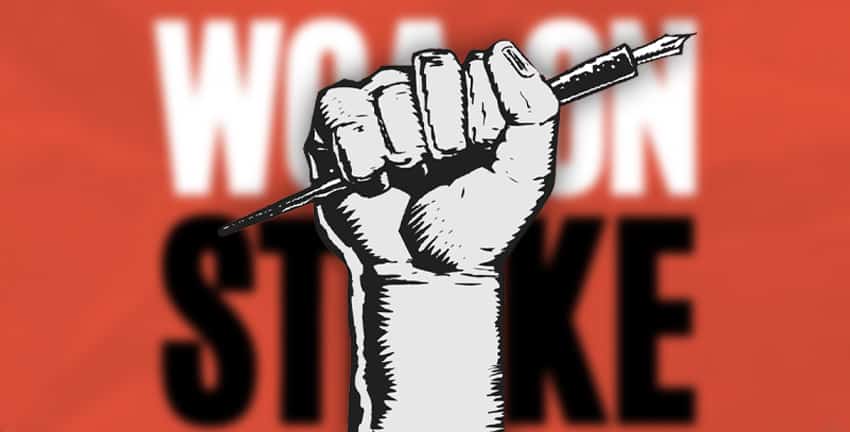Last week, the Writer’s Guild of America (WGA) were invited to meet with executive members of the Alliance of Motion Picture and Television Producers (AMPTP), which include notable names like Disney’s Bob Iger, in the hopes to bring the now nearing 120-day strike to a close. Unfortunately, though some of the items in AMPTP’s proposal from August 11th are noteworthy, it is not nearly enough and riddled with loopholes—at least according to a few members across the union.
As we outlined last month, the WGA are fighting for an array of issues that stem from (though not exclusive to) the advent of streaming, which has altered the way in which writers work at big studios for the worse. These studios—as noted in our piece with credits to WGA’s member memos—have found ways to profit greatly, irrespective of the shift away from traditional cable. Writers, however, have not seen a share of these profits due to streaming nixing the way residuals normally work. Beyond that, a fight for better salaries across the board, a minimum number of working weeks, as well as limiting the use of artificial intelligence were all a part of the WGA’s demands. Many of these items were addressed in AMPTP’s latest proposal, which they curiously made public after the two parties met last week. President Carol Lombardini of the AMPTP in a statement said that the association’s proposal, “meets the priority concerns the writers have expressed” and that they are “deeply committed to ending the strike and are hopeful that the WGA will work toward the same resolution.”

The now public proposal and statement by Lombardini didn’t go the way AMPTP had hoped, however. The WGA’s negotiating committee released a thorough written statement for their members late last week explaining the current state of affairs, a part of which reads:
“During the meeting with the CEOs we spent two hours explaining that, though progress had been made, the language of the AMPTP’s offer was, as is typical of that body, a version of giving with one hand and taking back with the other.
We repeated what we have said since day one, that our demands come directly from the membership itself. They address the existential threats to the profession of writing and to our individual careers, all caused by changes to the business model implemented by the companies in the last seven to ten years. We stressed that we could not and would not pick and choose among those threats; that we have not struck for nearly four months to half-save ourselves, nor are we leaving any sector of this Guild unprotected when we return to work. We are willing to negotiate within these areas, but every existential issue must be met with a genuine solution.”
The statement would go on to highlight some of AMPTP’s proposal, while noting how every item came with some caveat or another, or worse with vague verbiage that one (television studios) could easily find an exploitable loophole with. Vocal members of the WGA took to X (formerly Twitter) to vent their grievances with the proposal as well. Television writer, Amy Thurlow explained in an extensive thread on why she feels this offer by the AMPTP is “a giant nothing burger,” particularly highlighting the exploitable verbiage used in regards to deflecting certain responsibilities off to showrunners.

Towards the end of the the statement written by the WGA’s negotiating committee, it reads:
“The companies’ counteroffer is neither nothing, nor nearly enough. We will continue to advocate for proposals that fully address our issues rather than accept half measures like those mentioned above and other proposals not listed here. One last reminder illustrates why the AMPTP’s current stance doesn’t make sense. As we have repeated from the first day of our first member meeting – and on every day of this strike – our demands are fair and reasonable, and the companies can afford them.
This last sentence is poignant. Because yes, these big studios absolutely can afford what the WGA have counter-offered (and still have money left to give to their executives). I’m sure we’ve all read the headlines throughout recent years that say companies like Netflix and Hulu are losing subscribers and have far too high production budgets, therefore are on a one-way ticket to going belly-up. The truth of the matter, however, is that these streaming networks are making money; and a lot of it. A simple glance at some of the graphics the WGA posted earlier this year, and a bit more external research shows just how profitable Hollywood has been since the advent of streaming and VOD services. So I hope someone over at the producers association has even an iota of sense to give the writers (and now actors) what they rightfully deserve—because they’re the ones making the stories that are lining their pockets; and the sooner they realize that, the quicker we can get back to making stories.

